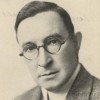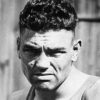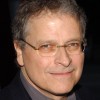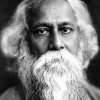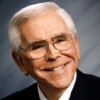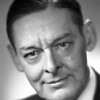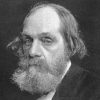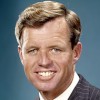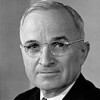The man who has done his level best, and who is conscious that he has done his best, is a success.
Quotations about:
try
Note not all quotations have been tagged, so Search may find additional quotes on this topic.
CHARLIE ANDERSON: I wanna say somethin’. I’ve known since the train that we weren’t liable to find him. It was just a hair of a chance that we got Sam back. I knew that. Maybe I knew even before we left home, but somehow I just had to try! And if we don’t try, we don’t do. And if we don’t do, why are we here on this earth?
A champion is someone who gets up when he can’t.
William Harrison "Jack" Dempsey (1895-1983) American professional boxer ("Kid Blackie," "The Manassa Mauler")
(Attributed)
(Source)
Comment after his fight with Luis Ángel Firpo (14 Sep 1923).
Did they live happily ever after? They did not. No one ever does, in spite of what the stories may say. They had their good days, as you do, and they had their bad days, and you know about those. They had their victories, as you do, and they had their defeats, and you know about those, too. There were times when they felt ashamed of themselves, knowing they had not done their best, and there were times when they knew they had stood where their God had meant them to stand. All I’m trying to say is that they lived as well as they could.
Better hazard once than be always in fear.
Thomas Fuller (1654-1734) English physician, preacher, aphorist, writer
Gnomologia: Adages and Proverbs (compiler), # 906 (1732)
(Source)
You don’t become great by trying to be great. You become great by wanting to do something, then doing it so hard that you become great in the process.
Randall Munroe (b. 1984) American webcomic writer, roboticist, programmer
XKCD, # 896 “Marie Curie” (9 May 2011)
(Source)
[T]he more education a man has, the less likely he is to invent new things. Possibly this is because from the moment the boy or girl starts in school he or she is examined three or four times a year and a failure or two and he or she is out. Now because an inventor works differently, he thinks that’s all wrong. He knows he’ll never go far on any problem before he strikes snags. He may flunk 999 times but if on his 1,000th try he succeeds, he wins! The only time you don’t want to fail is the last time you try a thing.
Charles F. Kettering (1876-1958) American inventor, engineer, researcher, businessman
Essay (1952-01), “Don’t Be Afraid to Stumble,” The Rotarian, Vol. 80, No. 1
(Source)
Kettering, who was R&D Director at General Motors for many years, constantly emphasized the need for experimentation and, by definition, learning from experimental failures. He had a number of aphorisms and passages that were repeated by him on various speaking occasions, or quoted / paraphrased from him by others, particularly the last line above.
In T. A. Boyd's biography of Kettering, Professional Amateur, Part 3, ch. 20 (1957), we have:It therefore seems that the only factor which needs to be corrected is to teach a highly educated person that it is not a disgrace to fail and he must analyze every failure to find its cause. We paraphrase this by saying, "You must learn how to fail intelligently." [...] For failing is one of the greatest arts in the world. [...] Once you've failed, analyze the problem and find out why, because each failure is one more step leading up to the cathedral of success. The only time you don't want to fail is the last time you try.
Here is this similar passage attributed to Kettering from a page blurb, "Don't Be Afraid to Stumble," Supervisory Management magazine, Vol. 2, No. 7 (1957-06):We need to teach the intelligent person that it is not a disgrace to fail and that he must analyze every failure to find its cause. He must learn how to fail intelligently, for failing is one of the greatest arts in the world. Once you've failed, analyze the problem and find out why, because each failure is one more step leading to success. The only time you don't want to fail is the last time you try.
The shorter the phrase, the more likely it is to be quoted on its own, e.g.:The only time you don't want to fail is the last time you try.
Which can be found in:Other variants that can be found:
- T. A. Boyd, Research, ch. 22 "Persistance" (1935).
- Society of Automotive Engineers (SAE) Journal, Vol 42, No. 2 (1938-02), covering the Detroit SAE Annual Meeting (1938-01-10 to 14).
- "The only time you mustn't fail is the last time you try."
- "The only time you can't afford to fail is the last time you try."
- "The only time you don't fail is the last time you try something, and it works."
‘Tis Perseverance that prevails.
Thomas Fuller (1654-1734) English physician, preacher, aphorist, writer
Gnomologia: Adages and Proverbs (compiler), # 5110 (1732)
(Source)
Let us think the unthinkable, let us do the undoable, let us prepare to grapple with the ineffable itself, and see if we may not eff it after all.
Douglas Adams (1952-2001) English author, humourist, screenwriter
Dirk Gently’s Holistic Detective Agency, ch. 20 [Dirk] (1987)
(Source)
Surely, in the light of history, it is more intelligent to hope rather than to fear, to try rather than not to try. For one thing we know beyond all doubt: Nothing has ever been achieved by the person who says, “It can’t be done.”
You have deeply ventured;
But all must do so who would greatly win.George Gordon, Lord Byron (1788-1824) English poet
Marino Faliero, Doge of Venice, Act 1, sc. 1 [Doge] (1821)
(Source)
I had applied for the nuclear submarine program, and Admiral Rickover was interviewing me for the job. It was the first time I met Admiral Rickover, and we sat in a large room by ourselves for more than two hours, and he let me choose any subjects I wished to discuss. Very carefully, I chose those about which I knew most at the time, current events, seamanship, music, literature, naval tactics, electronics, gunnery and he began to ask me a series of questions of increasing difficulty. In each instance, he soon proved that I knew relatively little about the subject I had chosen.
He always looked right into my eyes, and he never smiled. I was saturated with cold sweat.
Finally, he asked a question and I thought I could redeem myself. He said, “How did you stand in your class at the Naval Academy?” Since I had completed my sophomore year at Georgia Tech before entering Annapolis as a plebe, I had done very well, and I swelled my chest with pride and answered, “Sir, I stood fifty-ninth in a class of 820!”
I sat back to wait for the congratulations, which never came. Instead, the question: “Did you do your best?” I started to say, “Yes, sir,” but I remembered who this was and recalled several of the many times at the Academy when I could have learned more about our allies, our enemies, weapons, strategy, and so forth. I was just human. I finally gulped and said, “No, sir, I didn’t always do my best.”
He looked at me for a long time, and then turned his chair around to end the interview. He asked one final question, which I have never been able to forget or to answer. He said, “Why not?”
I sat there for a while, shaken, and then slowly left the room.
When we watch a child trying to walk, we see its countless failures; its success are but few. If we had to limit our observation within a narrow space of time, the sight would be cruel. But we find that in spite of its repeated failures, there is an impetus of joy in the child which sustains it in its seemingly impossible task. We see it does not think of its falls so much as of its power to keep its balance though for only a moment.
Rabindranath Tagore (1861-1941) Indian Bengali poet, philosopher [a.k.a. Rabi Thakur, Kabiguru]
Sadhana: The Realization of Life, ch. 3 (1913)
(Source)
Talking of the danger of being mortified by rejection, when making approaches to the acquaintance of the great, I observed, “I am, however, generally for trying, ‘Nothing venture, nothing have.'” JOHNSON. “Very true, sir; but I have always been more afraid of failing, than hopeful of success.”
‘Tis a lesson you should heed,
Try, try again;
If at first you don’t succeed,
Try, try again.(Other Authors and Sources)
T. H. Palmer, “Try, Try Again,” The Teacher’s Manual (1840)
(Source)
Sometimes attributed to Charles Theodore Hart Palmer (1827-1897), but the book is clearly by Thomas H. Palmer, and was published in 1840 when Charles T. H. Palmer was 13 years old.
What goals would you be setting for yourself if you knew you could not fail?
Robert H. Schuller (1926-2015) American televangelist, pastor, motivational speaker, author
You Can Become the Person You Want To Be, ch. 2 (1973)
Earliest version of this aphorism. Often attributed (without citation) to Eleanor Roosevelt. See here for more information.Variants:
- "What would you attempt if you knew you could not fail?"
- "If you knew you cold not fail, what would you try?"
- "What great things would you attempt if you knew you could not fail?"
That is the question of the New Frontier. That is the choice our nation must make — a choice that lies not merely between two men or two parties, but between the public interest and private comfort — between national greatness and national decline — between the fresh air of progress and the stale, dank atmosphere of “normalcy” — between determined dedication and creeping mediocrity. All mankind waits upon our decision. A whole world looks to see what we will do. We cannot fail their trust, we cannot fail to try.
Nothing will ever be attempted, if all possible objections must be first overcome.
Samuel Johnson (1709-1784) English writer, lexicographer, critic
The History of Rasselas, Prince of Abissinia, ch. 6 (1759)
(Source)
You can’t always get what you want.
But if you try sometimes,
You just might find
You get what you need.Michael Philip "Mick" Jagger (b. 1943) English musician, songwriter, producer, actor
“You Can’t Always Get What You Want” [with Keith Richards] (1969)
(Source)
Nought venter nought have.
John Heywood (1497?-1580?) English playwright and epigrammist
Proverbes, Part 1, ch. 11 (1564)
(Source)
More commonly rendered, "Nothing ventured, nothing gained."
Not failure, but low aim, is crime.
James Russell Lowell (1819-1891) American diplomat, essayist, poet
“For an Autograph,” st. 5 (1868)
(Source)
Only those who dare to fail greatly can ever achieve greatly.
Robert Francis Kennedy (1925-1968) American politician
“Day of Affirmation,” address, University of Capetown, South Africa (6 Jun 1966)
(Source)
For there is no comparison between that which we may lose by not trying and by not succeeding; since by not trying we throw away the chance of an immense good; by not succeeding we only incur the loss of a little human labour. But as it is, it appears to me from what has been said, and also from what has been left unsaid, that there is hope enough and to spare, not only to make a bold man try, but also to make a sober-minded and wise man believe.
[Non enim res pari periculo non tentatur, et no succedit; cum in illo ingentis boni, in hoc exiguae humanae operae, jactura vertatur. Verum ex dictis, atque etiam ex non dictis, visum est nobis spei abunde subesse, non tantum homini strenuo ad experiendum, sed etiam prudenti et sobrio ad credendum.]
Francis Bacon (1561-1626) English philosopher, scientist, author, statesman
Instauratio Magna, Part 2 “Novum Organum” [The New Organon],” Book 1, Aphorism # 114 (1620) [tr. Spedding (1858)]
(Source)
(Source (Latin)). Alternate translations:For the risk attending want of success is not to be compared with that of neglecting the attempt; the former is attended with the loss of a little human labour, the latter with that of an immense benefit. For these and other reasons, it appears to us that there is abundant ground to hope, and to induce not only those who are sanguine to make experiment, but even those who are cautious and sober to give their assent.
[tr. Wood (1831)]For it is not a case where there is an equal risk in not trying and not succeeding; since in the former instance we risk a huge advantage; in the latter a little human labour is thrown away. But from what has been said, and also from what has not been said, it seems to us that there is abundant ground of hope, not only to justify a stout-hearted man in trying, but even a prodent and sober man in believing.
[tr. Johnson (1859)]For the danger of not trying and the danger of not succeeding are not equal, since the former risks the loss of great good, the latter of a little human effort. But from what we have said and from other things which we have not said, it has seemed to us that we have abundance of hope, whether we are men who press forward to meet new experiences, or whether we are careful and slow to believe.
[tr. Silverthorne (2000) "The Great Renewal"]The loss that may come from not trying is much greater than what may come from trying and not succeeding: by not trying we throw away the chance of an immense good; by not succeeding we only incur the loss of a little human labour. But from what I have said (and from some things that I haven’t said) it seems to me that there is more than enough hope not only to get a vigorous man to try but also to make a sober-minded and wise man believe that he will succeed.
[tr. Bennett (2017)]
I have tried my best to give the nation everything I had in me. There are probably a million people who could have done the job better than I did it, but I had the job and I had to do it, and I always quote an epitaph on a tombstone in Tombstone, Ariz.: “Here lies Jack Williams. He done his damnedest.”
Harry S Truman (1884-1972) US President (1945-1953)
Time, “The Presidency: The Answer Man” (28 Apr. 1952)
Speaking in Winslow, AZ (15 Jun 1948), Truman said, "You know, the greatest epitaph in the country is here in Arizona. It’s in Tombstone, Ariz., and this epitaph says, 'Here lies Jack Williams. He done his damndest.' I think that is the greatest epitaph a man could have."
Our greatest glory is, not in never falling, but in rising every time we fall.
Oliver Goldsmith (1730-1774) Irish poet, playwright, novelist
The Citizen of the World: or, Letters from a Chinese Philosopher, Residing in London, to His Friends in the East, Letter 7 (1762)
(Source)
Ostensibly from a Chinese visitor to London, Lien Chi Altangi, the letters were written by Goldsmith and published in The Public Ledger in 1760-61. Letter 22 has the similar "True magnanimity consists not in NEVER falling, but in RISING every time we fall."
The saying is often attributed to Confucius (Letter 7's introduction implied that they were), but is not found in Confucius' work. The saying is also sometimes attributed to Ralph Waldo Emerson. See here for more discussion.
There are two great rules in life, the one general and the other particular. The first is that every one can in the end get what he wants if he only tries. This is the general rule. The particular rule is that every individual is more or less of an exception to the general rule.
Samuel Butler (1835-1902) English novelist, satirist, scholar
The Note-Books of Samuel Butler (1912)
(Source)

